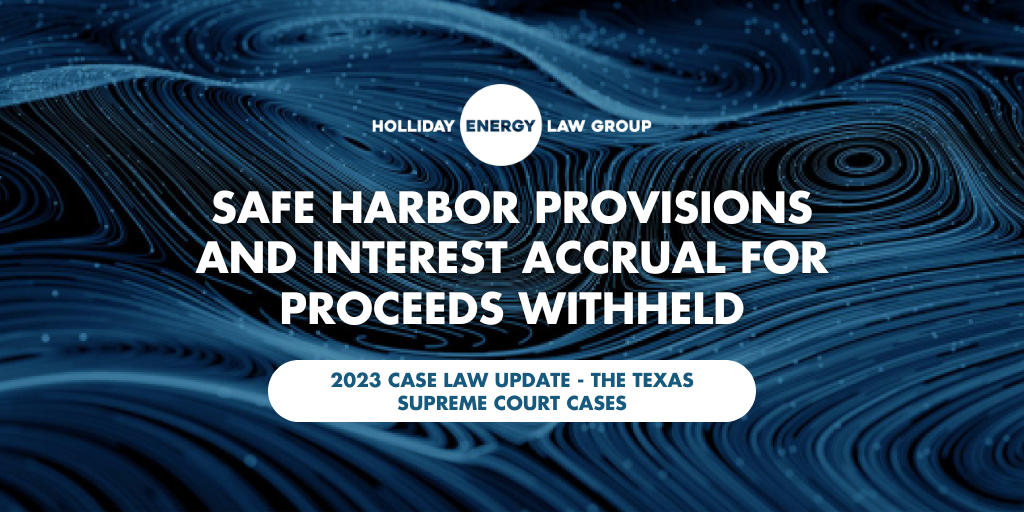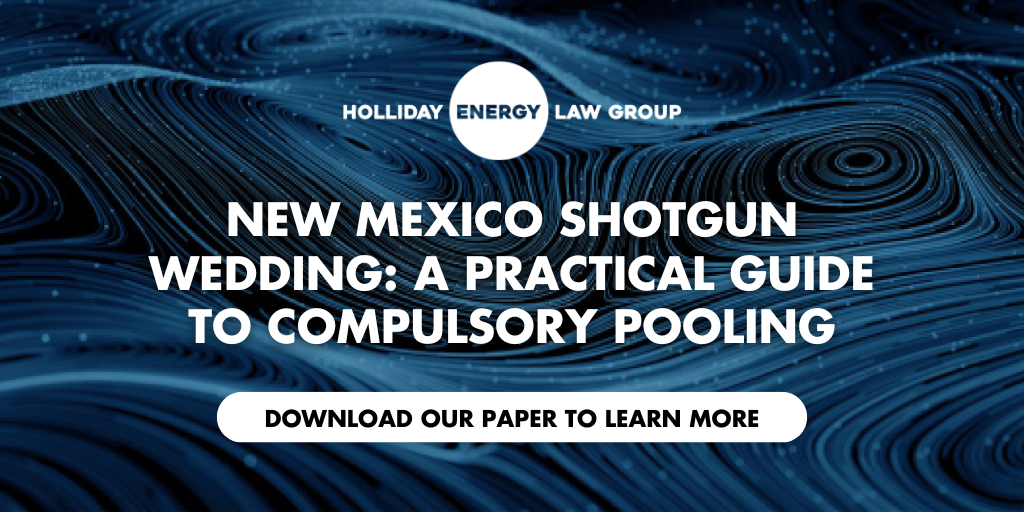Texas Natural Resources Code Suspense Statute - Safe Harbor Provisions and Interest Accrual for Proceeds Withheld

Freeport-McMoRan Oil & Gas LLC and Ovintiv USA Inc., v. 1776 Energy Partners, LLC, 672 S.W.3d 391 (Tex. 2023).
Key Takeaways
-
Operators have Safe Harbor where the title is jacked up.
-
The Texas Natural Resources Code allows withholding payments without interest when:
-
a “dispute concerning title” exists which “would affect the distribution of payments,” or
-
The payor has reasonable doubt that the payee has a clear title to the proceeds.
-
-
-
If a lessor wants interest in those situations, the lease or JOA must clearly and unequivocally state the same. Like, very clearly and unmistakably.
-
As a matter of law, a constructive trust being placed on a Payee’s leasehold interests created a reasonable doubt regarding clear title to production proceeds and justified the Payor taking “safe harbor” and withholding payments without interest.
This dispute centers around the issue of whether and when “safe-harbor” provisions from the Texas Natural Resources Code can justify an operator withholding contractually obligated production payments from the owners. The statute at issue is found in Texas Natural Resources Code Section 91.402 (“Safe Harbor Provision”)
In the present case, Ovintiv USA Inc. (“Ovintiv”) and 1776 Energy Partners, LLC (“1776”) entered into a JOA to develop acreage in Karnes County. The JOA designated Ovintiv as operator and required 1776 to pay its proportionate share of operating expenses in return for its share of production revenues.
In the present case, Ovintiv USA Inc. (“Ovintiv”) and 1776 Energy Partners, LLC (“1776”) entered into a JOA to develop acreage in Karnes County. The JOA designated Ovintiv as operator and required 1776 to pay its proportionate share of operating expenses in return for its share of production revenues.
Longview Energy Company sued 1776, claiming rightful ownership of the leases that 1776 had contributed to the JOA with Ovintiv. Longview received a judgment against 1776, and an appeal ensued. In response, citing the Safe Harbor Provision, Ovintiv promptly halted revenue payments under the JOA. 1776’s share of the proceeds were instead deposited into a suspense account, with Ovintiv netting out the share of expenses attributed to 1776/Longview. Ovintiv made clear that all funds would be allocated to the “rightful owner” once the dispute was fully resolved.
Trial & Appellate Court
In response to its NRI being placed in suspense, 1776 brought action against Ovintiv for breach of contract, demanding release of the production payments plus interest. During the course of this litigation, the judgment against 1776 in the Longview suit was overturned. Once a final judgment was entered, Ovintiv distributed the withheld payments to 1776, but still declined to pay interest. 1776 continued suit against Ovintiv order to collect interest that had accrued while the funds were withheld.
Ovintiv won at the trial court, only to have the 4th Court of Appeals reverse the judgment, remanding the case for fact issues surrounding the safe-harbor claims.
Texas Supreme Court
On appeal to the Texas Supreme Court, Ovintiv reiterated its statutory argument that the Safe Harbor Provision authorizes operators to withhold payments without interest under certain delineated circumstances, such as title disputes. Ovintiv argued that because it had sought safe-harbor pursuant to the Texas Natural Resource Code in the face of an active title dispute, 1776 was not entitled to the interest that had accrued while the title dispute was on-going.
Safe-Harbor Provision
While acknowledging the deadlines and penalties enforced by the Texas Natural Resources Code, the court clarified there are exceptions to these rules as well. Specifically, the “safe-harbor” provisions found in Section 91.402 sets out those instances in which a payor can withhold payments without interest: (1) a dispute concerning title that would affect the distribution of payments and (2) reasonable doubt that the payee has clear title to the/an interest in production.
- Dispute Concerning Title
The first safe-harbor situation – Title Dispute – requires the operator to establish two essential elements: that the dispute (1) existed during the time that payments were withheld, and (2) affected distributions of payments.
1776’s argued that the prior judgment did not affect payment distribution, as 1776 retained both legal and equitable title to the leases and interests at all times after the judgement and during the appeal. In rejecting this argument, the court revisited its past interpretations of the Safe Harbor provisions. Following a lengthy discussion of the ordinary definitions of the words in the statute such as “would” and “affect”, the court concluded that in order to effectively invoke the Safe Harbor Provision, an operator is only required to demonstrate that the title dispute would have an expected future impact on the distribution of payments.
Under the specific facts, regardless of whether or not legal title had actually transferred and despite the fact that there was no actual effect on payments, the court found that Ovintiv properly invoked the Safe Harbor Provision where it had a likely expectation that the prior judgment could affect distribution of payments. Thus, an operator will not be bound to a standard requiring them to predict the future. The purpose of the Safe Harbor Provision is to provide an operator with a mechanism to avoid liability for disputes between third parties, where the operator has a clear right to develop and produce. - Reasonable Doubt Regarding Clear Title
The second situation in which the Safe Harbor Provision can be invoked requires an operator to demonstrate a “reasonable doubt” that the owner (here, 1776) has “clear title to the interest in the proceeds of production.”
The question often, as it did in this case, comes down to the reasonableness of the doubt; was the operator’s doubt reasonable? Ordinarily, reasonableness is a question of fact for the jury to decide, such as when there is a disagreement about the facts themselves. However, in some, more limited circumstances, the question of reasonableness can be a question of law, meaning a matter for the court to decide. Once such instance is where there is no dispute about the material facts, and only one reasonable inference can be drawn from them. Note: How do you know which one you are faced with? No clue.
Pointing to the pending lawsuit, the prior judgment, and specifically, the effects of the prior judgment (the judge placed 1776’s interest was placed in a constructive trust during the pendency of the suit), the court held Ovintiv did in fact have a “reasonable doubt” as to whether 1776 Energy held clear title.
The court inferred that simply by the court having placed the interests in a constructive trust – which is the same mechanism used for wrongfully possessed properties – the ownership title was automatically unclear and that a reasonable doubt existed as a matter of law. Because the constructive trust made ownership unclear, the court found that Ovintiv likewise had an objective reasonable doubt as to whether 1776 had clear title to the property’s well production.
Under either Safe Harbor Provision – Section 91.403(b)(1)(A) & (B)(ii), the court held that Ovintiv was entitled to withhold the interest accrued from the withheld production payments. The court appeals decision was reversed, reinstating the trial court’s decision in favor of Ovintiv.
Follow us for more detailed insight into the 2023 Texas Oil & Gas Case Law Update or visit our Resources page for more valuable information.

.png)
